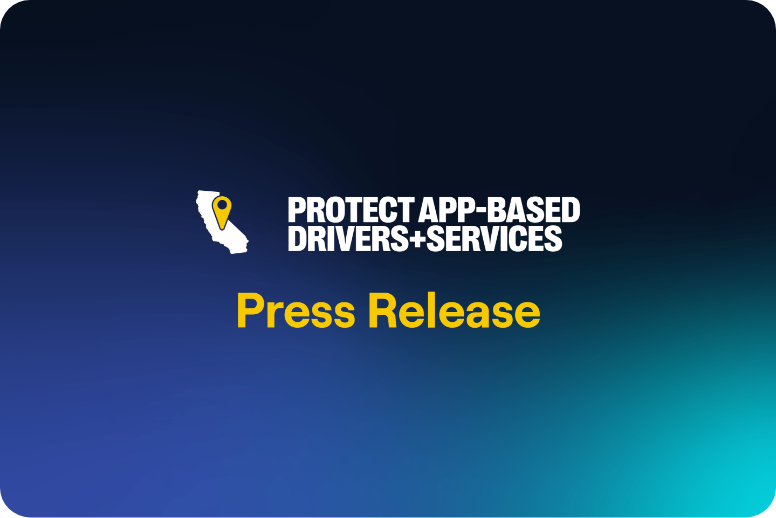By San Francisco Chronicle Editorial Board
Proposition 22 is a battle between two determined and equally unappealing combatants. Proponents consist of the gig economy companies — Uber, Lyft, DoorDash among them — that are pouring $180 million into a campaign to dictate how they would be regulated on workplace issues. Opponents are the labor unions and the politicians they control, who refused to come up with a reasonable compromise in Sacramento.
It’s hubris versus hubris, with voters left to make a binary choice in what should be a nuanced policy that would allow the ride-hail and delivery companies to keep rolling in a way that would increase driver pay and protections while acknowledging that their business does not fit within the realm of traditional employment.
As imperfect as it may be in many regards, Prop. 22 at least makes an attempt at striking that balance — and will keep the app-based, ride-hail and delivery services operating in California. The legislative recalcitrance and lawsuits from labor-beholden politicians in the state capital, San Francisco and elsewhere give us no confidence that a reasonable solution could be reached if the initiative were to fail.
The origin of this dispute is important to know:
The California Supreme Court’s landmark April 2018 decision involving the Dynamex courier and delivery service laid out a severely rigid test for whether workers should be classified as employees or independent contractors. In that case, the usurpation of worker rights was clear and unjust: In 2004, Dynamex reclassified its drivers as independent contractors as a cost-saving measure. The justices made the right call on the case, but went too far.
In that ruling, the court mandated that a hiring entity must satisfy all three of these criteria to classify a worker as an independent contractor:
- The worker is free from the “control and direction” of the hiring entity.
- The worker performs duties that are “outside the usual course” of the hiring entity’s business.
- The worker is engaged in an “independently established” trade, occupation or business.
Labor unions quickly pounced on the opportunity to etch those standards into California law, with Assemblywoman Lorena Gonzalez, D-San Diego, doing their bidding as author of Assembly Bill 5. The impracticality of the rigid rules (known as the “ABC test”) for certain endeavors became readily apparent, and interest groups began lining up for exemptions. Some received carve-outs right away (doctors, real-estate agents, hairdressers), others had to keep fighting this year to obtain them (interpreters, musicians and vocalists, youth sports coaches). Full disclosure: California newspapers (including The Chronicle) were among the industries that lobbied for relief from AB5 for newspaper carriers. The Legislature ultimately granted an extension until Jan. 1, 2022, for newspapers to comply with AB5.
Altogether, more than 100 exemptions have been issued.
But the process has been anything but rational. At one point, industry advocates seeking an exemption had to fill out an application with labor groups. One veteran legislator told us he had never seen elected officials so willingly delegate decisions to a special interest on a major bill.
Uber, Lyft, DoorDash and other gig economy companies, outcasts in Sacramento, never quite had a fair chance in the Legislature — and they knew they would have a more sympathetic audience with voters who have become accustomed to the convenience and responsiveness of their operations. They also knew they had no shortage of drivers who would vouch for their preference to be independent contractors.
And they are independent contractors by any reasonable definition not laid out by the court or politicians. They can decide when they want to work and for how long. They can work for anyone else they choose, including competitors. Most of us in traditional jobs would agree: That is not the generally understood definition of an employer-employee relationship.
Again, there are points to dislike about Prop. 22. Any change in the law would require a seven-eighths vote of the Legislature, a nearly impossible threshold for anything other than a Mother’s Day resolution. It does guarantee some new benefits for drivers (120% of minimum wage, health-care subsidies, vehicle insurance, occupational accident insurance, limits on driving hours, training programs) but less than the full array of legal protections they would enjoy as employees.
Under the status quo, with the rigid guidelines of AB5 and court rulings that they apply to these enterprises, there is a genuine risk that ride-hailing would be limited to hours in urban areas where predetermined shifts would be sufficiently lucrative. And there would be fewer opportunities for the majority of drivers who work part-time at hours convenient to them. It’s important to note that these ride-hail companies are not merely an alternative to taxis: They deliver food to homebound seniors, transport patients to and from medical facilities, and support bike-share networks.
Our preference would have been for our elected representatives to come up with a forward-looking solution in the public interest. AB5 failed to do that. Californians now must choose between two flawed options. Vote yes on Prop. 22
The Latest News

Press Releases
California Supreme Court Unanimously Upholds Prop 22 in Historic Ruling
Date: July 25, 2024 Contact: Molly Weedn, (415) 209-4217 [email protected] California Supreme Court Unanimously Upholds [...] Read more
Press Releases
PADS Responds to Conclusion of Oral Arguments on Prop 22
Date: May 21, 2024 Contact: Molly Weedn, (415) 209-4217 [email protected] The Coalition to Protect App [...] Read more